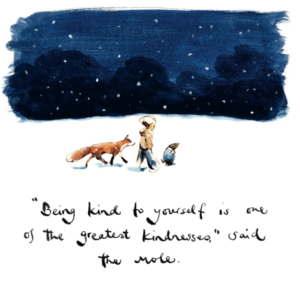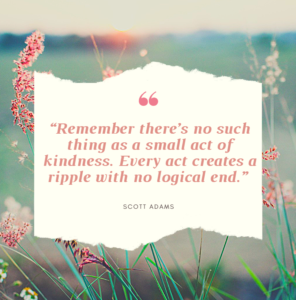Mental Health Awareness Week (UK) May 18th – 24th
It’s Mental Health Awareness Week in the UK. The theme has been changed to kindness in response to the coronavirus pandemic.
Why Kindness?
🌷Research shows acts of kindness can help improve emotional wellbeing. This is true whether we are giving or receiving it. You can learn more about that here:
🌷In uncertain times, kindness helps people to connect and communities to cope.
🌷Kindness offers a way to support the millions of people experiencing mental health problems.
🌷The kindness theme encourages all to reflect on the kind of society we want to shape as we emerge from this pandemic.
Teaching Kindness
Children learn what they see. What we expect from them must be what we model for them. Being kind to people we like is easy; what about those we don’t like – the people who annoy us/those we’d rather avoid?
Empathy and Compassion
Modelling kindness begins with practising empathy and compassion. In putting ourselves in the shoes of others and attempting to understand what they are going through, we begin to identify with them and can focus on ways to help.
We can teach children to build on their natural empathy by supporting them to understand their feelings and by supporting them to figure out how to help others. For example, if they see another child in tears, they may start to cry.
-
Discussing why they have reacted so is helpful, e.g., “I see you’re sad because Millie is upset she lost her toy.”
-
Support your child to think of ways to help, e.g., “I wonder if there is a way we can help Millie to feel better.”
Talking through all sorts of scenarios with children is a great way to build their empathy and understanding and to encourage them to look out for others.
It is important they show the same care and compassion for themselves also. Some can be very hard on themselves. Help your child to set realistic goals. Support them through disappointments and encourage them to try again. The wonderful Charlie Mackesy captures this so beautifully.

Doing the Right Thing
When we see wrongs done unto others, we are faced with a choice – do we reach out to stand up for them or do we avert our eyes and pretend we didn’t see it?
Being kind can be scary in situations such as this, but we return to the theme of empathy and compassion. If we were in the victim’s position, how would we want others to act?
Discuss with your child the role of bystanders to events. Teach them their choices: they can either be part of the problem, by staying silent; or part of the solution, by helping out.
Finding the Positive
Adopting a positive mindset and looking for the good in situations is an important trait to model for our children. I am reminded of Dorothy Law Nolte’s famous words,
If children live with criticism, they learn to condemn.
It is not easy to promote that which we cannot see in the world. It is not easy to look out for others if we feel downtrodden and have a negative outlook on life.
Are we using positive language with our children? Are we pointing out the moments of awe, wonder, kindness, care and generosity we see? Are we celebrating the good in the world?
Saying Sorry, Making Amends & Practising Forgiveness
It is hard to acknowledge and admit we have hurt others. It is difficult to be kind to those who have hurt us. Yet we know bearing grudges prevents us finding the positive and ignoring wrongdoing doesn’t stop it niggling at us.
It is important to model saying sorry. We don’t always get things right; we may snap and lose our temper. Apologising for those actions that fall short of our ideals is a vital life lesson for children.
Encouraging children to put things right when they have done something wrong, modelling acceptance of their apology and then moving on is important. We must not repeatedly bring up past mistakes and errors.
A trickier challenge for us lies in the question of how to ensure that in encouraging our children to forgive we don’t make them vulnerable or turn them into victims. The answer lies in equipping our children with the skills to advocate for themselves and assert their rights. Can you child assuredly say to someone, “I don’t like what you are doing. Please stop.” Have you built an open relationship whereby they can come to you for help in any and all situations (even where they may have been involved in some wrongdoing that has now escalated?)
Focusing on Feelings
Kindness feels good. If we want more of that feeling, we can spark it through our actions. Encourage your children to reflect on these questions:
-
How does it feel when others are kind to us?
-
How does it feel when we are kind to others?
Sparking Change
Although this is a UK awareness week, let’s not confine kindness to one week or one country. Let’s model it, teach it, spread it, and reap the rewards it brings. Let’s think of the society we wish to create and the values we wish to see more of in it.
Returning to Dorothy Law Nolte’s words of wisdom, as pertinent now as when first written. What are the values we wish to instil in our children? Are we modelling those values?
Children Learn What They Live
If children live with criticism, they learn to condemn.
If children live with hostility, they learn to fight.
If children live with fear, they learn to be apprehensive.
If children live with pity, they learn to feel sorry for themselves.
If children live with ridicule, they learn to feel shy.
If children live with jealousy, they learn to feel envy.
If children live with shame, they learn to feel guilty.
If children live with encouragement, they learn confidence.
If children live with tolerance, they learn patience.
If children live with praise, they learn appreciation.
If children live with acceptance, they learn to love.
If children live with approval, they learn to like themselves.
If children live with recognition, they learn it is good to have a goal.
If children live with sharing, they learn generosity.
If children live with honesty, they learn truthfulness.
If children live with fairness, they learn justice.
If children live with kindness and consideration, they learn respect.
If children live with security, they learn to have faith in themselves and in those about them.
If children live with friendliness, they learn the world is a nice place in which to live.
Copyright © 1972 by Dorothy Law Nolte.
One of my husband’s favourites quotes is pertinent here.

🌷Let’s not confine kindness to one country and one week!
🌷Discover more about National Mental Health Awareness Week here and check out their Kindness Matters video. How can you promote kindness today?
Take care and stay safe all!






